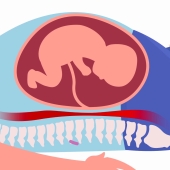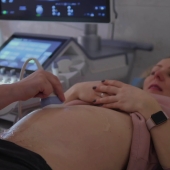One of the most exciting things to look forward to when you were expecting is finding out the sex of your baby. Even if you don't really have a preference for a baby girl or boy, having to wait until the week 18 to determine its gender with an ultrasound scan can be such sweet torture.
Some people believe that certain clues can reveal whether an expectant mother is having a girl or a boy. The shape of the tummy, the kind of food that the mother craves, and whether the belly is lying high or low are some popular ones. Others claim that the baby's heart rate in the wound can also predict gender. The accuracy of this claim is purely anecdotal, but it's a rather fun game to play, especially months later when you get to go around telling people that you were right.
If you want to know how to determine baby gender at 13 weeks, keep watching.
1 - Your baby's heart rate while in the womb can be a bit tricky to detect, especially early in the pregnancy. As your baby gets bigger and pushes against the walls of the uterus, the heart sounds become more audible. You do have several non-invasive options for fetal heart rate monitoring. Your doctor can determine the heart rate using a Doppler or ultrasound scan as early as eight weeks. If the pregnancy has advanced far enough, a stethoscope held against your tummy can detect a fetal heart rate. It does, however, takes a medical expertise to figure out where to place the scope, and then county actual heart beats. There were also some iPhone and Android apps like My Baby's Beat and Fetal Beats that claim to be able to detect fetal heart beat using your smartphone's built-in microphone.
2 - The normal heart rate range for a baby in the womb is between 120 and 160 beats per minute (pbm). If your baby's heart rate is 140 bpm or higher, it supposedly indicates that you are having a girl. By the same principle, a heart rate below 140 bpm means a baby boy in a few months.
3 - For some others, fetal heart rate proves to be an accurate indicator of the baby' gender, while it was totally off the mark for others. These results are hardly surprising, of course, as there is a 50:50 probability for a right and wrong prediction. Doctors explained that there really is no way to definitely figure out or predict baby gender at 13 weeks solely based on her great because the number of beats that your baby's heart makes per minute can vary depending on the situation. In fact fetal heart rate can vary widely within the normal range during the course of the day depending on your baby's activity level.
Ultrasound scans taken during the fifth or sixth month of pregnancy are still the most popular way to determine the baby's sex although gender determination through ultrasound is not 100 percent accurate as it requires a clear view of the fetus' genital area.
If the baby's legs are in the way baby happens to be facing the wrong way during the scan, there is usually no harm in booking another procedure. Alternatively doctors can also determine the sex of the baby much earlier and more conclusively through amniocentesis or chorionic villus sampling (CVS).
As these are invasive procedures that pose some risk to the baby, they are only carried out when there is a possibility of a serious sex-related genetic condition.
- 24624 views













